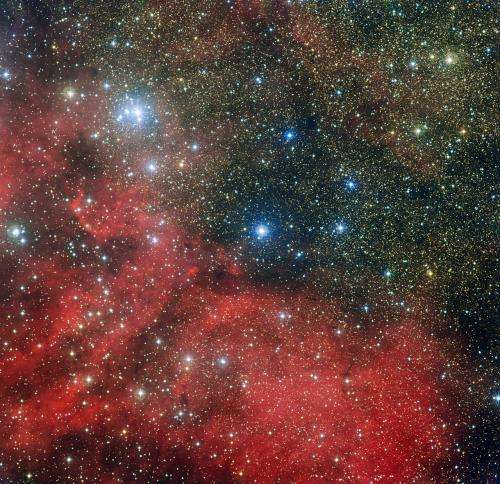A cluster within a cluster

(Phys.org) -- The star cluster NGC 6604 is shown in this new image taken by the Wide Field Imager attached to the MPG/ESO 2.2-metre telescope at the La Silla Observatory in Chile. It is often overlooked in favour of its more prominent neighbour, the Eagle Nebula (also known as Messier 16), that lies a mere wingspan away. But the framing of this picture, which places the star cluster in a landscape of surrounding gas and dust clouds, shows what a beautiful object NGC 6604 is in its own right.
NGC 6604 is the bright grouping towards to the upper left of the image. It is a young star cluster that is the densest part of a more widely scattered association containing about one hundred brilliant blue-white stars. The picture also shows the cluster's associated nebula — a cloud of glowing hydrogen gas that is called Sh2-54 — as well as dust clouds.
NGC 6604 lies about 5500 light-years away in the constellation of Serpens (The Serpent) and is located about two degrees north of the Eagle Nebula in the night sky. The bright stars are easily seen in a small telescope and were first catalogued by William Herschel in 1784. However, the faint gas cloud escaped attention until the 1950s when it was catalogued by Stewart Sharpless on photographs from the National Geographic-Palomar Sky Atlas.
The cluster's hot young stars are helping a new generation of stars to form in NGC 6604, by collecting star-making material into a compact region with their strong stellar winds and radiation. This second generation of stars will quickly replace the older generation, as although the brightest young stars are massive, they consume their fuel copiously and live short lives.
Aside from aesthetics, NGC 6604 has other reasons to draw the gaze of astronomers, as it has a strange column of hot ionised gas emanating from it. Similar columns of hot gas, which channel outflowing material from young star clusters, have been found elsewhere in the Milky Way and other spiral galaxies, but the example in NGC 6604 is relatively nearby, allowing astronomers to study it in detail.
This particular column (often referred to by astronomers as a "chimney") is perpendicular to the galactic plane and stretches an incredible 650 light-years in length. Astronomers think that the hot stars within NGC 6604 are responsible for producing the chimney, but more research is needed to fully understand these unusual structures.
Provided by ESO





















